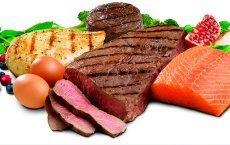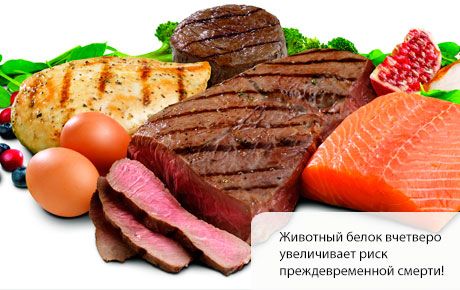New publications
Excessive consumption of protein foods leads to premature death
Last reviewed: 01.07.2025

All iLive content is medically reviewed or fact checked to ensure as much factual accuracy as possible.
We have strict sourcing guidelines and only link to reputable media sites, academic research institutions and, whenever possible, medically peer reviewed studies. Note that the numbers in parentheses ([1], [2], etc.) are clickable links to these studies.
If you feel that any of our content is inaccurate, out-of-date, or otherwise questionable, please select it and press Ctrl + Enter.

A research group from California has found that eating meat and cheese causes serious harm to the body, which can be compared to smoking. Such products are especially dangerous for middle-aged people, since scientists believe that animal protein increases the risk of premature death fourfold.

As a result of the study, scientists concluded that a diet high in animal protein poses almost the same health threat as nicotine. The research group analyzed about seven thousand people aged fifty years and older, all of whom took part in the national health and nutrition examination. As a result of the analysis, scientists found that people who consume large amounts of protein (20% of the daily calorie intake) are four times more likely to develop diabetes and cancer. In general, scientists noted that mortality in this case increases twofold.
Scientists have also determined that plant proteins do not cause as much harm to the body as animal proteins. According to experts, when consumed as food, protein affects the production of growth hormone, which helps maintain metabolism in adults, but in addition, protein promotes the growth of cancer cells.
After 65 years of age, the body experiences a protein deficiency, so eating protein foods at this age is necessary to maintain health.
Another study in this area was conducted by a group of Australian scientists led by Stephen Simpson. The specialists kept several hundred rodents on 25 different diets and as a result found that a diet rich in proteins and low in carbohydrates leads to a deterioration in appetite and the deposition of subcutaneous fat, while the scientists noted the development of diseases of the endocrine, cardiovascular system and a shorter life expectancy. The greatest harm to health is a diet high in fats, a diet rich in carbohydrates contributes to life expectancy, but such a diet does not contribute to weight loss. Experts recommend consuming protein foods no more than 10% of the daily calorie intake.
Experts note that people who decide to stick to a diet and limit the consumption of certain foods may face a number of psychological problems. A sharp restriction in food can provoke a kind of defense of the body, which as a result will begin to "demand" more food and as a result there may be a breakdown. The reason for the loss of control over the diet may also be caused by low motivation.
A person who decides to stick to a diet consciously sets the body to limitation, which can ultimately lead to negative consequences (stress, nervous disorders). The human body during a diet experiences stress during the period of getting used to a new diet and restrictions on certain products, and this can cause severe nervous disorders.

 [
[